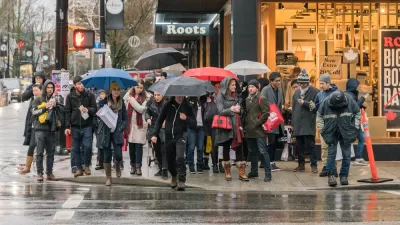It makes more fiscal sense to buy flood-prone land and conserve it than to cover the costs of the damages to developments, according to researchers from the University of Bristol and other institutions.

"Keeping vacant, flood-prone lands free of development could save taxpayers billions," writes Eli Chen, sharing the findings of new research published recently in the journal Nature Sustainability.
The study "found that every $1 spent acquiring undeveloped properties in the 100-year floodplain — which have a 1% chance of flooding in any given year — returns $5 that would be spent on emergency services, flood insurance claims and other flood damage costs if those properties became developed."
"As the number of people living in flood-prone regions like St. Louis is increasing, local governments should consider protecting undeveloped floodplain properties instead of building on them, said Barbara Charry, the floodplain and nature-based solutions strategy manager for the Nature Conservancy’s Missouri chapter."
To find solutions to the challenges of making that vision a reality, the Nature Conservancy is working with the Army Corps of Engineers "to develop a plan to improve floodplain management for the eight municipalities along the lower Meramec River," reports Chen.
Historic floods inundated the Mississippi River watershed during last year's rainy season.
FULL STORY: Cities Buying Empty Lots In Flood-Prone Areas Could Save Taxpayers Money, Study Claims

Planetizen Federal Action Tracker
A weekly monitor of how Trump’s orders and actions are impacting planners and planning in America.

Maui's Vacation Rental Debate Turns Ugly
Verbal attacks, misinformation campaigns and fistfights plague a high-stakes debate to convert thousands of vacation rentals into long-term housing.

San Francisco Suspends Traffic Calming Amidst Record Deaths
Citing “a challenging fiscal landscape,” the city will cease the program on the heels of 42 traffic deaths, including 24 pedestrians.

Amtrak Rolls Out New Orleans to Alabama “Mardi Gras” Train
The new service will operate morning and evening departures between Mobile and New Orleans.

The Subversive Car-Free Guide to Trump's Great American Road Trip
Car-free ways to access Chicagoland’s best tourist attractions.

San Antonio and Austin are Fusing Into one Massive Megaregion
The region spanning the two central Texas cities is growing fast, posing challenges for local infrastructure and water supplies.
Urban Design for Planners 1: Software Tools
This six-course series explores essential urban design concepts using open source software and equips planners with the tools they need to participate fully in the urban design process.
Planning for Universal Design
Learn the tools for implementing Universal Design in planning regulations.
Heyer Gruel & Associates PA
JM Goldson LLC
Custer County Colorado
City of Camden Redevelopment Agency
City of Astoria
Transportation Research & Education Center (TREC) at Portland State University
Jefferson Parish Government
Camden Redevelopment Agency
City of Claremont




























